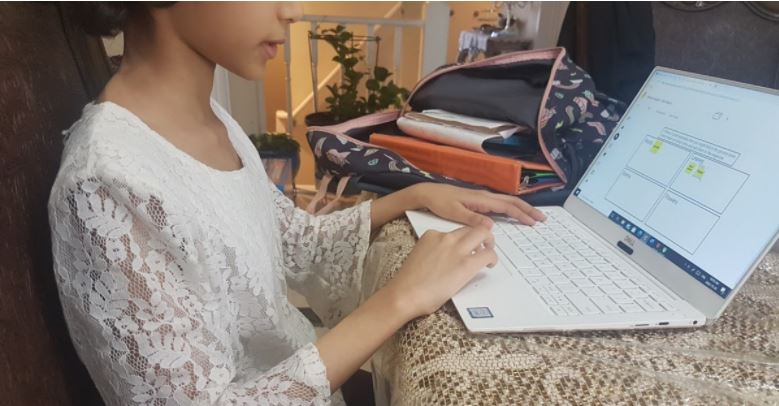As school children navigate the new environment of online or hybrid education, many new Canadian parents are having to face challenges of their own, including feelings of isolation, struggles to reconcile work and home life, and, in some cases, adjusting to an entirely new career in a new country. But for some, the silver lining is better control of what their children are learning.
With the fear of COVID-19, many parents felt it was safer to choose online schooling at home for their kids, especially since Ontario has been setting new records in the daily number of cases.
Sadef Masood has five children, two of them of school age and doing online schooling at home: Chaudhry Ali Sarwar is in grade 7, and Chaudhry Muhammad Sarwar is in grade 8. Kids could be heard playing and laughing in the background, as she talked to NCM on the phone.
“They are totally living in the house, they are not facing the outside world,” she said. “That is also necessary especially with their mental growth, they need the capacity to discuss things with others.”
Missed opportunities for connection
She also feels that she is missing out as a parent, and thinks that parents should have one-on-one meetings with teachers once in a while.
“As parents we are always very busy, so with online schooling we get less of a chance to meet with other parents. We used to get to visit teachers and meet them in-person. We were communicating with teachers a lot, now not so much.”
According to Anna Triandafyllidou, the Canada Excellence Research Chair on Migration and Integration at Ryerson University, online schooling lacks structure for socializing.
“There are missed opportunities to interact with teachers or the interaction is much more structured and formal, It’s a big loss for both the children and the parents,” Triandafyllidou said.
This lack of engagement can overall make immigrant families feel more isolated and in some cases have an impact on their mental health. It also makes providing online settlement, welcoming and support services more important and urgent.
The Toronto District School Board (TDSB) spokesperson Ryan Bird said in an email that the board is still working on certain details of how parent-teacher interviews will be carried out this year but he can confirm that they will be done remotely this fall.
Stories from other parents seem to confirm this need for connection through a variety of channels.
Valerie Lam’s daughter, Jasmine, is in grade 12 at Dunbarton High School in Pickering. She has a counsellor at school who she can speak to in person, but Lam says the support service needs to be more accessible online too.
“Just as there are guidance counselors at school, I think they need to provide online services, too, for support for kids,” she said.
Working parents under extra pressure
Julianne Jabaralli has a daughter in grade 3 and a son in junior kindergarten. Jabaralli is a teacher for the TDSB, but she said online learning was still a challenge and added stress for her.
“I was working also, so it was difficult to balance their school stuff as well as my responsibilities. It just was a lot [because] we had to be helping a lot with teaching at home. We just couldn’t do it,” she said.
Jabaralli said with the challenges of online school and working at home, she had no time to pay attention to how certain issues were being discussed or taught.
But that is not the case for everyone.
Telisa Roessappono lives in Mississauga and works from home. Her son is in grade 3. As a parent, she said having her child learn from home has given her more of a “peace of mind.”
“I know exactly what they’re learning”
“When they were in school, I didn’t really know what he was learning. I usually received whatever marks, quiz, tests but I never knew what they were really learning,” Roessappono said. “But now I have access to classrooms. So I know exactly what they’re learning.”
Roessappono said her son has started learning about Indigenous history and it has been nice being a part of that.
She said in the past she had a lot of concerns about what was being said in class, what was being taught and if there was something she “didn’t want them to learn yet, like sexual education.”
“But now, I feel that because I know if there’s anything that I don’t approve of for them to learn, I can just say something right away or after class. Before [with in-person learning] you don’t know or you don’t know until the damage is done. So I feel like I can kind of supervise from a distance now.”
The teachers are “very open and ready to listen” to feedback from parents, which is nice to have, Roessappono added.
She also feels that her son has become more technologically informed and independent thanks to online education.
“I can focus more on my work knowing that there is another adult virtually pretty much supervising and teaching him,” she said.

Reedah Hayder
Reedah Hayder is a journalist based in Toronto and a member of the NCM-CAJ Collective, actively reporting and managing social media. She is a second-generation immigrant and covers community, women's health, education and politics. She currently attends the Ryerson school of journalism and writes for The Eyeopener.




